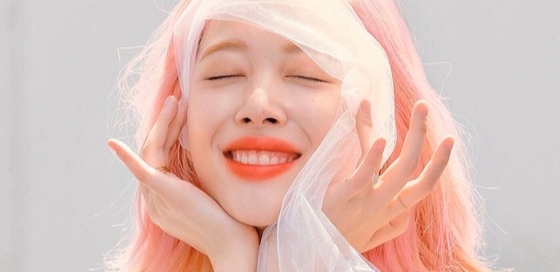This week saw the untimely passing of former f(x) member Sulli, also known as Choi Jin-ri. A singer, actor and model, Sulli made waves with her forward thinking stance on social issues such as feminism, mental health and abortion, but with progressive views comes regressive backlash. At the tender age of 25, she ended her own life due to a continuous onslaught of online abuse throughout her career. But where did it all go wrong?
When Choi Jin-ri became Sulli, f(x)’s innocent maknae was born. She instantly became a beloved figure in the Kpop world because of her overwhelming beauty and honey-like vocals. This, coupled with her impressive acting skills, cemented her position as one of Kpop’s princesses. The public were besotted with her and couldn’t see Choi Jin-ri outside of her stage persona – until her first scandal in 2014.
2014 was the year that Sulli’s relationship with hip-hop star Choiza was revealed. The public reaction was instantaneous; hate comments flooded her social medias, with neitzens condemning the relationship due to their 14 year age gap. They resented the fact that Sulli wasn’t the polished idol they forced her to be – her new rapper boyfriend was a complete contrast to her squeaky-clean image. Yet the hate the couple received was skewed: Sulli, deemed ‘out of Choiza’s league’ received more hate than Choiza did. We can attribute that to South Korea’s sexism towards women – trolls branded her a ‘hypocrite’ and a ‘liar’, because her idol image was so at odds with Choiza’s association with drugs and sex.
The scandal made people question the contradictory nature of the standards idols are held to. Why is it that female idols are expected to sing about love but never experience it? Sulli was a young woman who simply wanted to date, like other women her age did – she should have never been subjected to the hate she had to endure.
But this scandal was just the beginning of the prolonged campaign of bullying against her. The ferocity of the anger directed towards her exacerbated her mental health issues, forcing her to withdraw from f(x). Korean conservatives didn’t hold back, labelling her newfound quirky public persona as ‘absurd’ and ‘inappropriate’ in newspapers and in digital print for the world to see.

Choi Jin-ri
In 2016, Sulli suffered another scandal when she posted pictures on Instagram of herself…without a bra on. That was all it took for her critics to band together and unleash their vitriol upon her. It became so bad that she felt compelled to explain why she’d posted the pictures. She explained: “Going braless is one’s freedom. Bras have wires; they are not good for [your]health. Not wearing one is comfortable. That is something beautiful and natural. For me, a bra is like an accessory. Some outfits go with it, and others do not. That’s why I sometimes do not wear a bra…when I upload my photos without a bra, people talk about it a lot. I could have been scared. But I didn’t because I thought it would be nice if more people could discard their prejudices. I want to step outside the box, tell people (not wearing a bra) is not a big thing.” South Korea is notorious for being conservative, especially about women’s bodies. For one of the country’s biggest stars to publicly defy social norms was unheard of, especially as it was a woman who dared to make that leap. Neitzens called her an ‘attention seeker’ amongst other vile insults because she decided to stop wearing bras. Discard their prejudices they did not; instead, they harboured them.
From this point, it seemed that everything she did drew criticism from all directions. She spoke candidly about mental health, recounting her experiences with panic disorder, social phobia and depression, in attempts to raise awareness. She even starred on a show shortly before her death about cyberbullying and malicious commenting. She was openly pro-choice, a feminist and above all, a strong, independent woman. These are all things to be commended for, yet neitzens managed to turn these massive achievements into yet more reasons to hate on her.
Amidst the tsunami of online trolling that she was the target of, Sulli reportedly made repeated attempts to make SM take action against the malicious commenters. Once made aware of the issue, SM tried to curb the influx of hate messages against her, but struggled as many of these comments were made outside of Korea. As the abuse continued, in one of her last televised appearances she said she felt that her life was ‘empty’ and that she felt she had to pretend to be happy.
Her death has sparked a global discussion on cyberbullying, especially towards public figures. Several celebrities have spoken out denouncing malicious commenters – Shinhwa’s Dongwan posted a powerful message addressing the lack of mental health support in the Kpop industry. Her former bandmate, Victoria, shared a post berating malicious commenters, asking them: “Who has the right to tell someone else how to live?” This is the question that hopefully every single malicious commenter and every news outlet that encouraged them asks themselves.
Sulli’s death could have been prevented. She did nothing but be her true and authentic self in a society that made every attempt to repress her. The neitzens that attacked her every move and the news outlets that added fuel to the fire need to take responsibility for this tragedy.
9 members of the national assembly have proposed the ‘Sulli Act’ to be written into law. This bill would introduce harsher punishments to those who send online hate and will be supported by 200 of Sulli’s colleagues or friends who have experienced cyberbullying, as well as over 100 organizations. Whilst this is a bold move for South Korea to take, it is truly a shame that it took two publicised deaths – Sulli and the late SHINee member Jonghyun – to get the ball rolling.
Choi Jin-ri translates into English as ‘truth.’ That’s how she lived – she lived her own truth. She was brave enough to live her short life the way she wanted to. But she was more than just an idol or an actress – she was a true trailblazer who was strong enough to rebel against an unjust system. She paved the way for progressive discussion in life and in death she continues to be the inspiration that so many adored.
May she rest in peace.

Choi Jin-ri (29th of March 1994 – 14th October 2019.)
If you or a loved one are suffering from depression or suicidal thoughts, please reach out.
- UK Samaritans: 116 123 (open 24 hours, 7 days a week)
- A list of available UK helplines, crisis services and information here
- A list of international helplines here
Opinions expressed are solely the writer’s own and may not represent the views or opinions of UnitedKpop Ltd.


![[OP-ED] Remembering Sulli in the age of cyberbullying.](https://unitedkpop.com/wp-content/uploads/2019/10/Sulli-Tribute-Featured-1078x516.jpg)
![[OP-ED] With the Kakao M and Spotify Controversy, Everyone Loses (For Now)](https://unitedkpop.com/wp-content/uploads/2021/02/nws-spotify-kakaom-214x140.jpg)
![[OP-ED] How Kpop Changed My View Of Music](https://unitedkpop.com/wp-content/uploads/2020/10/got7-justright-1-214x140.jpg)
![[OP-ED] H1GHR MUSIC: Why Now is The Perfect Time For a Compilation Album](https://unitedkpop.com/wp-content/uploads/2020/08/h1ghr_bluetape-214x140.jpg)